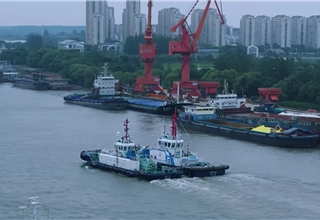CATL Supports China's First Hydrogen-Electric Tugboat at Qingdao Port
Key Ideas
- CATL-supported 'Hydrogen Electric Tug No. 1' commences operations at Qingdao Port, setting a benchmark for green port operations.
- The tugboat features the largest lithium battery capacity in the country, enabling true zero-carbon emissions and reducing carbon dioxide emissions by 1,500 tonnes annually.
- Equipped with CATL's advanced marine energy solution, the tugboat sustains over 12 hours of operation at a cruising speed of 9 knots, enhancing performance in demanding marine conditions.
- CATL continues to expand its portfolio of zero-carbon marine solutions, contributing to the decarbonization of various maritime segments including harbor operations and freight shipping.
China's first hydrogen-electric tugboat, 'Hydrogen Electric Tug No. 1,' supported by CATL, has started operating at Qingdao Port in Shandong. This innovative vessel is considered the most powerful port tugboat in the country and boasts the largest lithium battery capacity among its peers. The tugboat, equipped with CATL's advanced marine energy solution, ensures true zero-carbon emissions, providing a replicable model for green port operations. Tugboats are crucial in port logistics, and the shift towards low-carbon operations has led to the emergence of battery-powered tugboats as a significant innovation. The 'Hydrogen Electric Tug No. 1' is equipped with a high-performance battery system, featuring a capacity of 7,838.88 kWh and a peak output of 5,200 kW, enabling it to operate for over 12 hours at a cruising speed of 9 knots. This tugboat is expected to reduce carbon dioxide emissions by 1,500 tonnes annually, aligning with Qingdao Port's goal of achieving zero-carbon operations. CATL's ongoing efforts in developing zero-carbon marine solutions include projects such as hybrid luxury catamarans and fully electric cruise ships, showcasing the company's commitment to decarbonizing various maritime sectors.
Topics
Maritime
Innovation
Carbon Emissions
Battery Technology
Marine Industry
Sustainable Transportation
Maritime Decarbonization
Port Logistics
Latest News
